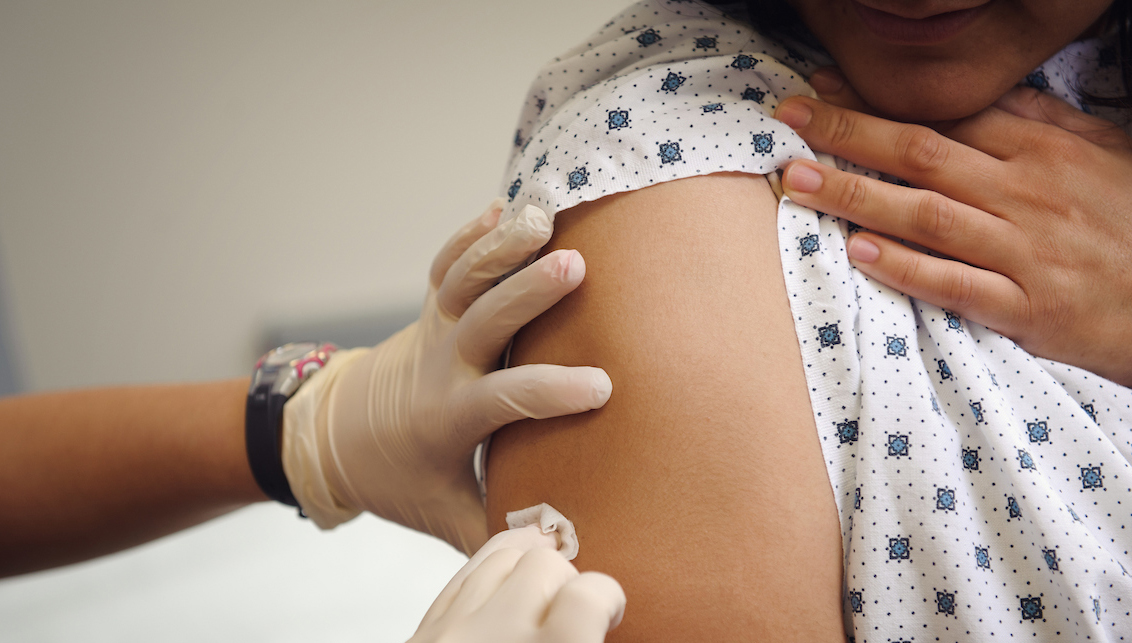- Caleb Hess
- COVID-19, Health Tips, Healthy Living, Medicine, Show on VR homepage
When’s the best time to get vaccinated? Right now.
School of Medicine physician clarifies the choices between, and the timing of, vaccines

Vaccinations
Understanding which vaccines and boosters are necessary—and when to get them—may seem overwhelming. Robert O. Carpenter, MD, MPH, from the Texas A&M University School of Medicine, helps demystify the decision. Carpenter has been heavily involved with Texas A&M-led efforts to distribute vaccines and provide more equitable care to rural Texas populations.
Decisions, decisions
The Centers for Disease Control and Prevention and the U.S. Food and Drug Administration have approved another round of COVID-19 boosters to protect against the most prevalent forms of the virus’ omicron variant. But after these vaccines became available on Sept. 2, guidelines changed again just a few weeks later on Oct. 12. This is the most recent in a series of changes that complicate choices about vaccinations.
Beyond guideline changes, there are viruses other than the virus that causes COVID-19 to consider. The ongoing monkeypox emergency, the re-emergence of vaccine-derived polio in New York and the yearly surge of influenza (flu) mean there are several diseases circulating for which vaccines are available.
Carpenter explained that while timing your vaccinations might appear complicated, it is simpler than it seems. “People are trying to be ‘too smart’ about timing about the vaccines,” he said. “They think there’s got to be some secret to it. But there isn’t.”
Of course, there are complicated elements to getting the right vaccines. Whether one should get a COVID-19 booster depends on factors such as the time since last dose, age and vaccine formulation. Some people, such as those with a history of cancer or rheumatoid arthritis, are not considered “fully vaccinated” until they get three doses of the primary vaccine, whereas others are considered “fully vaccinated” and boosted after receiving three doses of the COVID-19 vaccine. Because of the evolving nature of COVID-19 variants and vaccine formulations, however, Carpenter adds that the term “fully vaccinated” has largely fallen out of use.
Although COVID-19 vaccines still receive much attention, it is important to consider getting the yearly flu shot as well, Carpenter says. He adds that those who are immunocompromised or over 65 years old should discuss getting a high-dose influenza vaccine to stimulate the intended immune response.
It’s about time, not timing
Influenza cases begin to rise during October in the United States. Carpenter stressed that this year, the flu struck early and is combining with other illnesses like Respiratory Syncytial Virus (RSV) to have a more significant impact on health systems than in recent years.
The flu tends to spread within the southern hemisphere before making its way north. Because it spreads most rapidly during their winter—which occurs in June, July and August below the equator—experts get a “preview” of how severe a flu season might be during winter in the northern hemisphere. This year, early predictions are indicating a more severe flu season than usual. That is in addition to the WHO’s recent statement that COVID-19 remains a global health emergency.
Therefore, it’s important to get vaccinated as soon as possible. How soon? Carpenter clarified: “When’s the best time to get vaccinated? It’s right now.”
But it isn’t the flu alone that looms. Other respiratory illnesses, including COVID-19, begin to spread more quickly during fall before peaking in winter, between December and February. Although infection rates rise in the fall, it’s not too late to get vaccinated—in fact, it’s still a great time to do so.
When asked about the safety of getting multiple vaccines at once, Carpenter reiterated, “Is it safe? Yes. It’s safe to get them on the same day.” It’s also possible to develop both COVID-19 and influenza at the same time resulting in a higher risk for severe illness, hospitalization and even death, which further incentivizes getting both vaccinations.
Just what does the doctor order?
However, Carpenter also understands that the messaging around vaccines can be confusing. “People should consult health care professionals when they have questions about getting vaccinated,” he said. He suggests people talk to their primary care providers, pharmacists or nurses but that they “need to stop getting their vaccine information from unverified sources online such as social media,” adding that a conversation with a health care professional will yield the best answers to your questions.
Carpenter said the rapidly changing official guidelines are one reason people should consult clinicians. He also mentioned that when someone reads about another person’s experience with a vaccine—positive or otherwise—they’re at risk of conflating that person’s experiences with their own.
Additionally, Carpenter said, not everyone needs to rush to get the monkeypox or an additional dose of the polio vaccines. However, if someone falls into an at-risk category, they should discuss with their health care team the benefits of being vaccinated. The number of doses available is limited, and “we don’t want a repeat of what happened with COVID, where people lied to get a vaccine—either out of fear or because they really wanted to take a trip,” because doing so depletes the available doses, meaning vaccines may not be available to those who need them most.
With diseases like monkeypox and polio in those already vaccinated in childhood, he emphasizes that the overall risk of contraction is low. Even those who may be at-risk should refrain from panicking. “No one should rush to get vaccinated just because they hear about monkeypox on the news,” he said. Instead, he advises that if someone is in a risk group and has habits that might elevate their risk, they should talk to their care provider and fully weigh the benefits of getting vaccinated based upon their specific health history.
Media contact: media@tamu.edu


